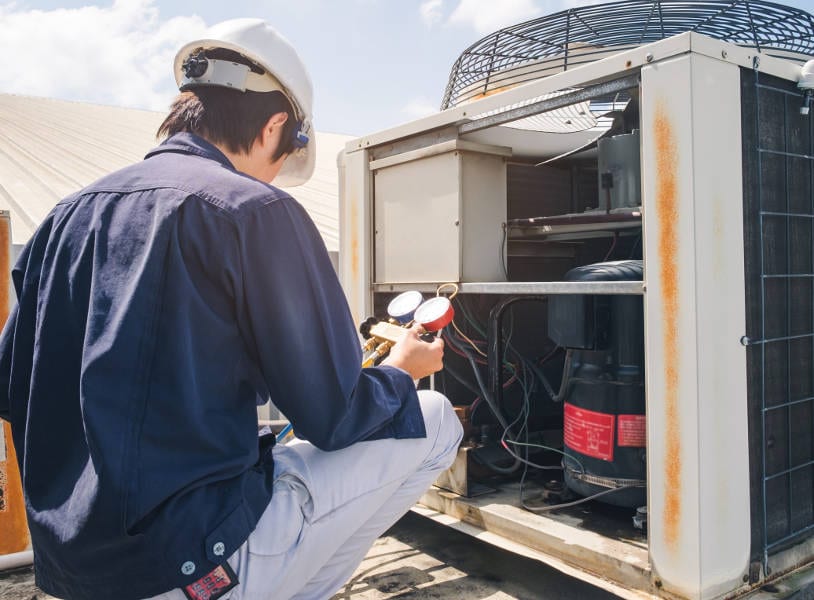An Efficient HVAC is responsible for the comfortable temperatures and good air quality in your home. So, the longer your HVAC system lasts, the longer you live in comfort.
An HVAC system has a set or definite lifespan. It is made to work efficiently for a given period. That is 10-15 years for air conditioners and 15-25 years for furnaces. But just like any other electrical appliance, it can work longer than anticipated or die off much sooner because of different reasons.
For this article, we shall discuss ways of prolonging your HVAC’s lifespan.
Regularly Change the Air Filters
A dirty and clogged air filter makes an HVAC system work overtime. The AC has to use more energy to blow cool air out of the air vents. And this can lead to the collapse of your HVAC system.
Regularly clean out or change the HVAC filters to prolong your HVAC’s lifespan. Depending on the type of filters, inspect them regularly in a period of 1 to 3 months.

Carry out Routine HVAC Maintenance and Repair
Regular maintenance keeps an HVAC system in excellent working condition. When carrying out maintenance, ensure that you check /inspect, clean, tune-up, and repair any minor problems that you may find in your air conditioner and furnace systems.
Doing this helps you get rid of debris and any new issues in their early stages. And this will make your HVAC system more efficient, safer, and longer-lasting.
You can carry out the HVAC maintenance at least once a year. Spring is an excellent time to service your AC, while early fall or late summer is ideal for furnace servicing.
Use a Smart Thermostat
If your goal is to increase your HVAC’s lifespan, a smart thermostat is the way to go.
Smart thermostats easily and quickly regulate the temperature of your HVAC system. They are easy to program and control from wherever you are using any smart gadget. Say, a smartphone or tablet.
With smart thermostats, you can program the temperature in your home for set time frames/periods. The smart thermostats adjust the temperature according to the hours you are at home, thereby reducing the use of your HVAC. This saves energy, saves on utility bills, and prolongs the lifespan of your HVAC system.
Superior smart thermostats automatically make any needed energy-saving changes without your input. These thermostats do this by learning the schedule and habits of your HVAC system. And in so doing, make any temperature readjustments seamlessly.
Routinely Clean Your Air Ducts
Air ducts distribute the cooled or heated air throughout your house. And just like filters, they collect dust and dander. But also, unlike filters, air ducts don’t clog up quickly. So you can clean them up every 4 or 5 years.
Doing this increases the longevity and efficiency of your HVAC system, thereby improving the air quality in your home.

Put Your HVAC Fan Setting on ‘Auto’
Most HVAC systems have a duo fan setting. There is the “on” and the “auto” setting.
The “on” setting means the fan will be on and working 24/7, 12 hours a day and 12 hours a night. This means that the fan will not get some downtime to rest. Although the “on” setting improves the air quality in your home, it strains the fan, thereby shortening its lifespan.
On the other hand, “auto” means that the fan only works when the HVAC system is actively cooling or heating. This setting provides a resting time for the fan, which prolongs your HVAC’s lifespan.
Improve Your Home Insulation
Ample insulation means your home doesn’t lose heat (warmth) and cooler air quickly.
To prolong your HVAC system, amply insulate or improve your home’s insulation. You will enhance your home’s property to keep the warmth or cooler air that the ac or furnace provides when you do so.
When poorly insulated, your home easily loses the warm or cool air. And this makes your HVAC work harder for more extended periods of time to maintain the comfortable temperatures in your home. And in so doing, shorten the HVAC lifespan.
Get Repairs promptly
Although regular maintenance significantly increases the lifespan of your HVAC, it is not sufficient when your HVAC becomes older.
The older your system gets, the more issues it will have. To keep it in good working condition, you have to repair it in time. This will prevent it from worsening and dying off.
Regularly care for the condenser
The condenser part of your HVAC system stays outside the house. This exposes it to harsh weather, damage, dust, and debris.
So diligently care for it. You can do this by regularly opening it up and cleaning its vents and filters, repairing any visible damage, painting it or oiling it to safeguard it from rust, removing any weeds or vegetation that grows around it, and so on.
Use Other Heating and Cooling Methods
There are other ways to maintain the temperature you want in your home.
To cool your home, you can use ceiling fans to produce cooler air in your home. You can also use reflective shades to stop heat from entering your house.
To stay warm, open your windows and the blinds to let in the sun to heat up your home. You can also set the thermostat to a lower temperature, wear warm clothes, and use space heaters.
Doing this reduces the use of your HVAC, thereby prolonging the lifespan of the HVAC unit.
Buy a quality HVAC
Quality matters. You don’t expect a fake HVAC to work well and last long. A poor-quality HVAC system will also be problematic during its short lifespan. You will spend a tidy sum to keep it going.
So, to have a chance at prolonging your HVAC lifespan, buy a good HVAC model from a trusted HVAC dealer.
Conclusion
After doing all the above, your HVAC is guaranteed to last long. If you need a maintenance expert, professionals, like those at Anderson Air, can help you with all your HVAC maintenance needs.






